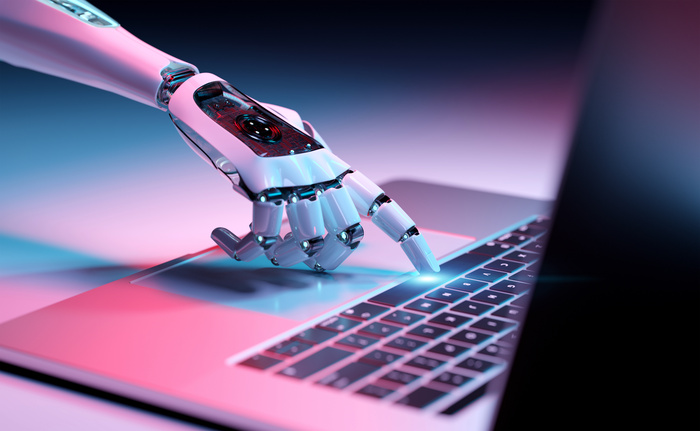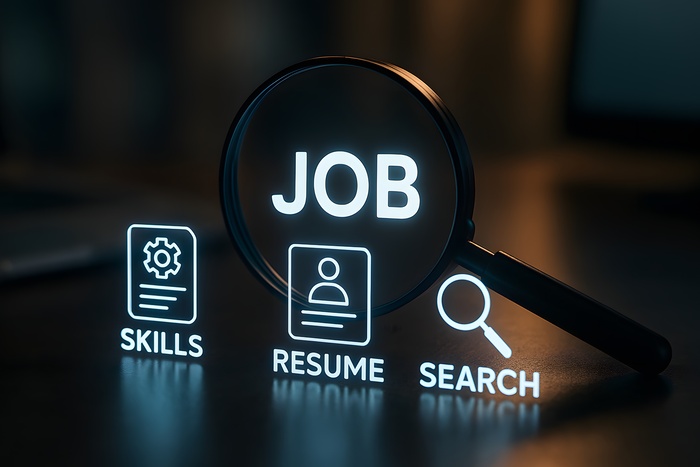Anúncios
Master the power of Artificial Intelligence in your daily workflow.

Have you ever imagined having an assistant who never gets tired, is available 24/7, and can perform tasks with impressive speed and accuracy?
That’s essentially the promise of Artificial Intelligence in the workplace. What once seemed like science fiction is now reality — and it’s accessible to any professional.
In this article, you’ll discover how AI can transform the way you work, boost your productivity, and even open doors to new career growth opportunities.
It’s not just about automating tasks, but about working smarter, more strategically, and with greater freedom.
What AI Is and How It Fits Into Your Work Routine
Artificial Intelligence, in simple terms, is the ability of machines to learn, interpret information, and make decisions based on data.
When applied to the workplace, it becomes a real asset: it helps organize tasks, write texts, analyze reports, predict behaviors, and much more.
The game-changer? You don’t need to be a tech expert to benefit from it. Intuitive tools — often with interfaces that look like a simple chat — are making AI accessible to professionals across all fields.
This means more time to think, create, and innovate — while the machine handles the operational part.
How AI Supercharges Your Productivity
Picture this: you need to write reports, answer emails, plan meetings, and still deliver strategic results.
Sounds familiar? Now imagine having a technology that drafts for you, organizes your calendar, analyzes data, and suggests actions based on behavioral patterns.
AI not only speeds up repetitive tasks — it also improves the quality of your work. By delegating routine tasks to a machine, you gain time for what truly matters: thinking ahead, refining processes, and standing out.
What’s more, artificial intelligence learns over time. The more you interact with it, the more accurate it becomes. It’s like having an assistant who evolves with you.
AI Tools That Are Already Making a Difference
The beauty of AI is that it’s everywhere — you just need to know where to look. There are tools that write personalized emails in seconds, others that create presentations from simple outlines. Some help manage entire projects by automatically delegating tasks to your team.
There are also platforms that transcribe meetings, generate smart summaries, and even suggest improvements based on previous interactions.
And if you work with data, get ready: there are solutions that interpret spreadsheets, detect hidden patterns, and create stunning graphs with a single click.
Whether you’re a manager, analyst, designer, or entrepreneur, there’s an AI tool ready to enhance your performance. Just try it — and be amazed.
Ethics and Strategy: Using AI Consciously
But it’s not all sunshine and roses. With great power comes great responsibility. And when it comes to AI, ethics must walk hand-in-hand with innovation.
It’s essential that the use of these tools be transparent, conscious, and responsible. This means protecting sensitive data, validating automatically generated content, and above all, keeping the human perspective in control.
AI can suggest, predict, and execute — but you are the one who decides.
Knowing how to use technology to your advantage without giving up your critical thinking is what truly sets apart a regular professional from a strategic one.
The New Skills of the AI Era
Working with artificial intelligence requires new skills. The good news? You don’t need to relearn everything from scratch, but rather adapt and improve what you already know.
One of the most valuable skills today is knowing how to ask good questions. Yes, questions. The clearer and more specific your requests to the AI, the better the responses. This practice, known as “prompting,” has become a sought-after skill across many industries.
Also, interpreting and refining the outputs is essential. AI delivers answers — but it’s up to you to validate them, put them in context, and add the human touch no machine can replicate.
Being open to learning, exploring new tools, and adjusting your routine is what will keep you relevant and competitive in the market.
What AI Still Can’t Do (and Maybe Never Will)
As impressive as it is, artificial intelligence isn’t magic. It still struggles with emotions, ambiguity, or situations that require empathy and moral judgment.
It doesn’t know, for example, what motivates your team, the right tone for sensitive feedback, or when a client is dissatisfied just by their expression.
It doesn’t understand cultural nuances the way a human does, nor can it make decisions based on values.
That’s why it’s essential to view AI as an ally — not a replacement. The best teams are those where humans and machines work together, each doing what they do best.
AI Tools Already Making a Difference
The beauty of AI is that it’s everywhere — you just need to know where to look. Below is a list of tools that are transforming the daily routine of professionals in various fields:
AI for Communication and Writing
- ChatGPT: Great for writing emails, generating content ideas, proofreading, and even drafting reports.
- Jasper AI: Excellent for copywriting, content marketing, and persuasive writing focused on conversions.
- Grammarly: Goes beyond grammar correction — improves tone, clarity, and writing impact.
AI for Organization and Productivity
- Notion AI: Helps summarize notes, generate ideas, and organize projects efficiently.
- ClickUp Brain: Turns meetings into tasks, automates reminders, and centralizes team management.
- Motion: Builds intelligent schedules based on deadlines, priorities, and your work pace.
Conclusion: More Performance, Less Burnout
Artificial Intelligence is not here to take your place — but to help you take a more strategic role in the world of work. By adopting AI tools consciously, you free up time, increase your productivity, and strengthen your ability to make smarter, more informed decisions.
The professional of the future isn’t the one who knows everything — it’s the one who knows how to use the right tools the right way. And that future has already begun.
Now that you know how AI can transform your professional routine, how about preparing for the next step in your growth journey?
In our next article, we’ll talk about “How to Succeed in a Job Interview” — with practical tips, communication techniques, and even how to use artificial intelligence to your advantage in this decisive moment.
Recommended Content
